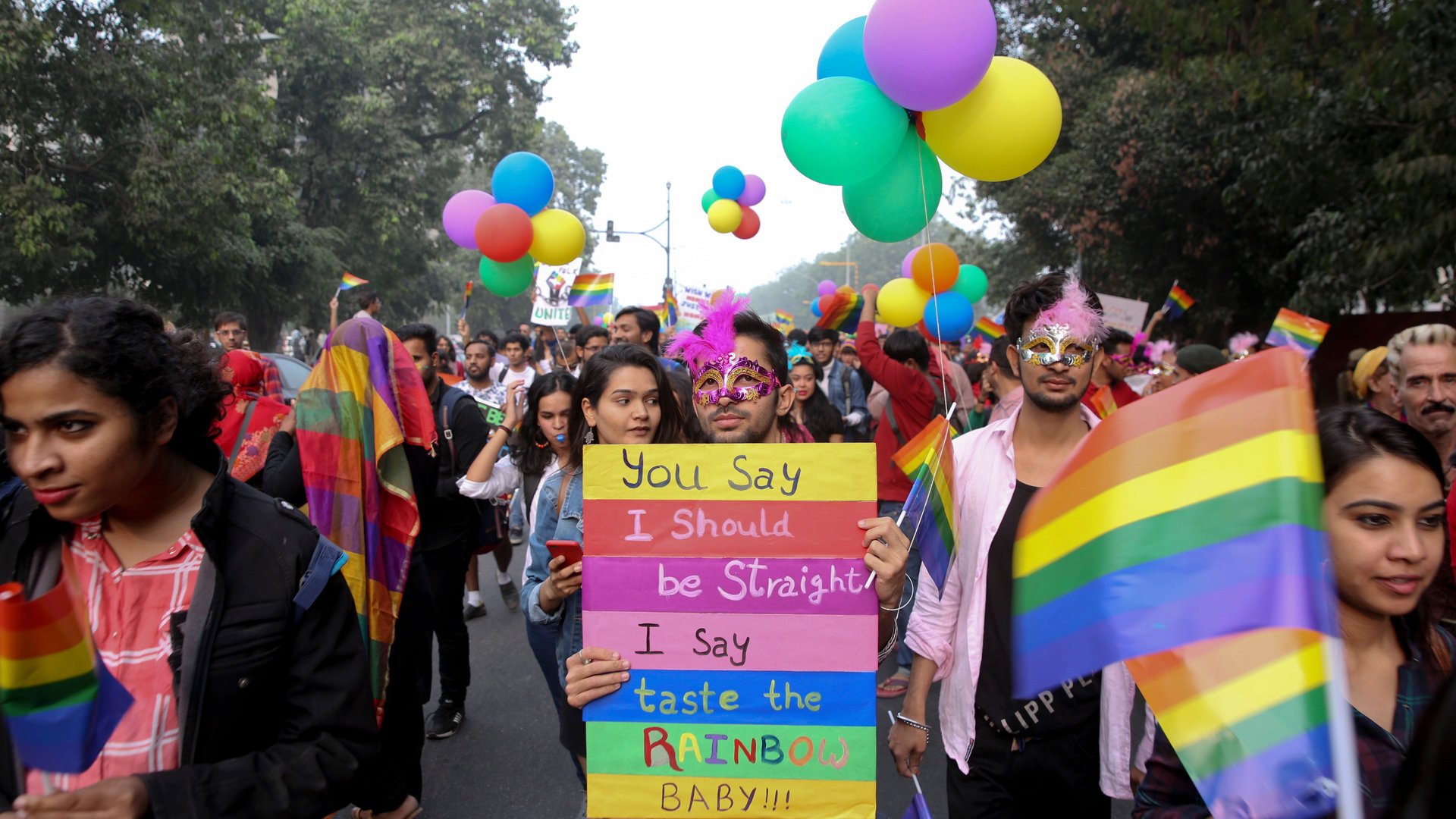For India’s LGBTQ community, scrapping section 377 is only the first step
After its battles of two decade or more, India’s LGBTQ community is finally rejoicing.


After its battles of two decade or more, India’s LGBTQ community is finally rejoicing.
Today (Sept. 06), the supreme court delivered a historic verdict, striking down the draconian section 377 of the Indian Penal Code that criminalised homosexual activity.
“Any discrimination on basis of sexual orientation amounts to [a] violation of fundamental rights,” chief justice Dipak Misra said in his judgment.
Though the verdict marks a win, the fight is still on inside and outside the courtroom as the LGBTQ (lesbian, gay, bisexual, transgender and queer) community seeks acceptance in terms of marriage laws, adoption laws, and more.
Here’s what members and supporters of the community have to say:
Jack Harrison Quintana, executive director of Grindr for Equality, an initiative by the gay dating app:
“Quantitatively, the only comparable moment in the history of decriminalisation was when China made our community legal in 1997. But in the case of India, this is a struggle to throw off the legal shackles historically put in place by the British to control the bodies of their colonial subjects. A decision in our favor will have reverberations all around the Commonwealth from Botswana to Singapore, where activists are still struggling to reclaim their rights in the wake of the British imperial project.
This could result in huge changes for the LGBTQ+ community in India. So many LGBTQ+ people all over the world grow up receiving messages about themselves that we are sick or that our sexual orientation is wrong. It’s impossible to underestimate the toll this can take on our community’s mental health and thus on all aspects of our lives…
None of this is to say that there won’t be more battles to fight. LGBTQ+ activists in India still have a long road ahead to achieve full liberation for our people. Their fierce advocacy has brought things this far and hopefully a decision in our favor will only allow more and more people to join in this fight.”
Divya Roop, androgynous homosexual, a vocal LGBTQ activist, and part of India’s first gay choir group, Rainbow Voices:
“The only thing that’s going to change is we can be assured that we won’t be counted as criminals for loving someone we wanted to…
It’s not going to change much at a personal, professional, or social front because on those levels, individual mindset has to change. I don’t think people changed their minds about women only after the government allowed equal rights to women. Any political or legal change doesn’t really change the mentality of people. That’s a struggle that has to be dealt and fought every single time. Even today, there are several men who still think women are the lesser half of men even though right to equality has been there since forever.
Hansal Mehta, director of 2016 Bollywood film Aligarh, which shed light on gay victimisation in small-town India, in a TV interview with Times Now:
“This is a symbolic judgement and we have a long road ahead. As a society, we need to reflect and bring about attitudinal change. It’s important to understand what the judgement says. That two consenting adults can make personal choices irrespective of gender, caste, (and) religion. They must be allowed that choice.”
R Verma, an IIT-Bombay student who identifies as queer:
“It’s amazing, it’s exhilarating, it’s emotional….It’s freedom. I’m no longer a criminal. I can plan on telling my parents. I can think of settling in India. I’m more than happy—I’m gay! I understand picture abhi baki hain (there are still strides to be made), but the first level of achieving gay rights is achieved.”
Menaka Guruswamy, lawyer who represented a group of IIT students who sought the repeal of section 377, in an interview with Republic TV:
“It’s a big, big win today for the constitution’s idea of India. Justice Rohinton Fali Nariman stressed on the importance of the government educating its employees, sensitising members of police force…psychiatrists playing a role, mental health professional playing a role. These are very detailed directions.
The big takeaway here is that court is really saying two things: One, we are a constitutional democracy and there will always be difference of opinion but the constitution expects you to respect each other. Second, in India, you have the ability to make different choices, have different opinions and dissent…The decisions today laying a foundation for the citizenship. I don’t want to speculate (on other laws i.e. marriage, adoption, etc.).”
Harish Iyer, 39-year-old equal rights activist:
Even if we get our rights, the 2013 verdict reminds us that it can be taken back sometimes. We cannot afford to be complacent. Our real struggle is not in the courtrooms, it is bedrooms, kitchens, and boardrooms. We will win one crucial battle with adult consensual sex being decriminalised, however, it is only the first step of many firsts.